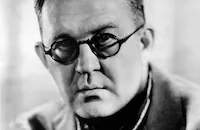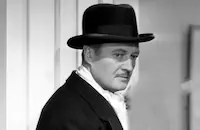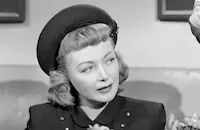Born Reckless
Cast & Crew
John Ford
Edmund Lowe
Catherine Dale Owen
Warren Hymer
Marguerite Churchill
Lee Tracy
Film Details
Technical Specs

Synopsis
Louis Beretti and two of his gang are arrested on a robbery charge. As a result of a newspaper campaign initiated by reporter Bill O'Brien to promote the election of the district attorney, the trio are sent overseas to fight in the war. Back in New York, Beretti drifts into the nightclub business, but he is brought back into contact with the East Side Gang when "Big Shot" settles his account with Ritzy Reilly for squealing. Later, when Sheldon's sister reports her child missing, Beretti effects the rescue and shoots it out with Big Shot, who demands an accounting because he failed to "keep his nose clean," resulting in Beretti's death.

Director

John Ford
Cast

Edmund Lowe
Catherine Dale Owen

Warren Hymer

Marguerite Churchill

Lee Tracy
William Harrigan

Frank Albertson
Paul Page
Ferike Boros
Paul Porcasi
Joe Brown

Eddie Gribbon
Mike Donlin
Ben Bard
Pat Somerset

J. Farrell Macdonald
Roy Stewart
Jack Pennick

Ward Bond
Yola D'avril
Crew

Film Details
Technical Specs

Articles
Born Reckless -
The script by Dudley Nichols, drawn from a novel by Donald Henderson Clarke, is a gangster story centering around Louis Beretti, an Italian-American thief played by Edmund Lowe. After he's arrested, he is sent not to prison but into the Army and off to fight in World War I. He returns as a war hero to New York, where he opens a speakeasy but stays in the orbit of his old criminal gang, leading to murder and kidnapping.
Reviews for this atmospheric crime melodrama were mixed. Variety noted the film had originally been intended for Paul Muni (which would have made this, not 1932's Scarface, Muni's first gangster role), and the trade paper didn't find Lowe terribly convincing in his place: "It's an open question if Edmund Lowe isn't miscast. Certainly he doesn't look like an Italian gangster-bootlegger. He does well enough but his name rather than his performance will be the chief box office asset of the film." Variety also criticized Born Reckless for a "complete absence of love interest" and for a "mechanical" tone, but singled out supporting player Warren Hymer as the most dynamic and burly of the story's gangsters. The New York Times, on the other hand, deemed the picture "thoroughly entertaining... Blessed with clever acting, keen humor, and a minimum of stereotyped stuff."
Ford himself was not very fond of the film. He later told Peter Bogdanovich: "it wasn't a good story... and in the middle of the picture they go off to war, so we put in a comedy baseball game in France. I was interested in that."
Film scholar William K. Everson indicated that the movie may have originally been intended for director Raoul Walsh, whose sensibility seems more attuned to this type of story. The stiff dialogue scenes were staged by Ford's friend Andy Andrew Bennison.
Men Without Women and Born Reckless were also the first two Ford films on which Dudley Nichols worked as screenwriter. He would become a key collaborator with Ford, working on 14 Ford features in all, including the landmark Stagecoach (1939).
By Jeremy Arnold
SOURCES:
Peter Bogdanovich, John Ford
Scott Eyman, Print the Legend: The Life and Times of John Ford

Born Reckless -
Quotes
Trivia
Notes
Sources Disagree in crediting the role of the district attorney.














